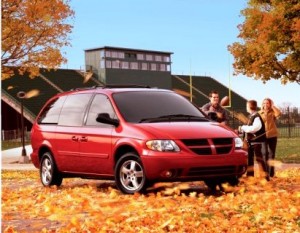Chrysler is conducting what it deems is a “safety improvement campaign” – and not a safety recall – covering model year 2005-2006 Dodge Caravan, Grand Caravan, and Chrysler Town & Country Vehicles.
More than 312,000 minivans in 27 states are affected –thus far.
A memo from the National Highway Traffic Safety Commission said it does not agree with Chrysler’s plan, but also says, “in the interest of remedying the affected vehicles expeditiously and to avoid a protracted dispute, Chrysler is implementing steps to replace the front crash sensors.”
In other words, Chrysler refuses to conduct a formal safety recall. Moreover, NHTSA is making a judgment call that allows some of the sensors to be replaced instead insisting that Chrysler replace of all of them – a remedy which would apparently require lengthy legal action.
This service action controversy comes after NHTSA Administrator Ray LaHood faced two days of tough questioning at Congressional hearings over the safety agency’s actions – or lack of actions – in Toyota unintended acceleration or sticky accelerator pedal defects that are allegedly responsible for as many as 34 deaths. Critics contend that NHTSA closed investigations prematurely, or limited their scope, thereby missing early warnings of Toyota safety defects.
Front airbag sensors or a control module may be defective in hundreds of thousands of minivans. The front crash sensors in question may crack under “environmental conditions” where road salt is in common use, and allow water to enter the sensor. This can cause the sensor to become inoperative and illuminate the airbag warning light. These sensors were added to enhance the performance of the airbag system in certain frontal crashes and are not required to comply with the law, according to a Chrysler memo to the NHTSA.
In the Chrysler minivan defect, if a front crash sensors fails the driver is alerted by the illumination of the “airbag warning light.” Chrysler says that the van should be promptly serviced. Until the Dodge or Chrysler minivan so affected is repaired, the airbags may not work.
NHTSA has decided that “further use of its resources” does not appear to be warranted. NHTSA is therefore closing the investigation.
“The closing of this investigation does not constitute a finding by NHTSA that no safety-related defect exists in the subject vehicles,” NHTSA said. The agency “will monitor the issue and reserves the right to take further action if warranted by the circumstances.”
This is a geographically limited service campaign for vehicles originally sold in or currently registered in the states of Connecticut, Delaware, Iowa, Illinois, Indiana, Kansas, Kentucky, Massachusetts, Maine, Maryland, Michigan, Minnesota, Missouri, Nebraska, New Hampshire, New Jersey, New York, North Dakota, Ohio, Pennsylvania, Rhode Island, South Dakota, Tennessee, Utah, Vermont, Virginia, West Virginia, Wisconsin, Alaska, and the District of Columbia.
Critics, of course, maintain that such campaigns, while limiting the cost to the automaker, do not get to all the potentially defective vehicles.
About 185,000 of model years 2005-2006 minivans are not included in the recall – even though these vehicles use the same crash sensors and were built at the same time. Chrysler told NHTSA that they experience “significantly lower failure rates” because of reduced road salt exposure.
Chrysler will replace the front airbag sensors with a new design. This service will be performed free of charge. The safety “improvement campaign” will begin during June 2010. Owners may contact Chrysler at 1-800-853-1403.
Chrysler’s campaign number is J38. NHTSA campaign number: 10V008000. NHTSA action number: RQ09003.

